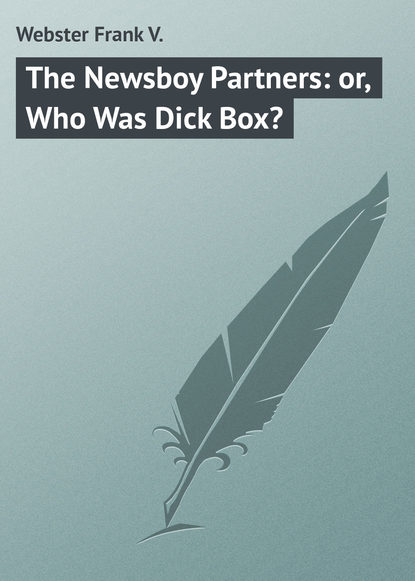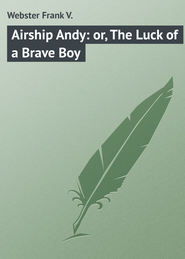По всем вопросам обращайтесь на: info@litportal.ru
(©) 2003-2024.
✖
The Newsboy Partners: or, Who Was Dick Box?
Настройки чтения
Размер шрифта
Высота строк
Поля
There were many other moving pictures, the performance lasting over an hour. During a lull, when there was no picture on the screen, Jimmy looked around him. On a seat behind he saw Mike Conroy and Bulldog Smouder, his two enemies of that afternoon.
"Goin' t' punch me after de show?" asked Mike with a leer.
"Aw, cheese it," advised Jimmy. "I'll git square wid youse somehow."
There was no time for further talk, as another picture was shown and the boys were absorbed in that. Jimmy could hear Bulldog and Mike whispering back of him, but he paid no attention to them.
When the show was over and Jimmy was out in the street, Nosey having left him, he began to think of where he should spend the night. This was something he usually left until the last moment.
"Guess I'll treat meself t' a good ten-cent bed t'-night," he said, lighting another cigarette. "What's de use of havin' money if youse can't spend it?"
He put his hand in the pocket where he kept his change. To his surprise his fingers met with no jingling coins.
"Dat's queer," he remarked. "Where's me dough?"
He felt in another pocket. Then in all of them in turn.
"Stung!" he exclaimed. "Some guy has pinched all me coin an' I'm dead broke. I had a dollar an' fifty-two cents left an' now I ain't got a red. Me luck certainly has shook me. What's t' be done?"
CHAPTER III
A BOX FOR A BED
For some time Jimmy stood still in the street. The brilliantly-lighted Bowery stretched away in either direction; a throng of persons, mostly bent on such pleasure as the place afforded, were traveling up and down. No one paid any attention to the friendless newsboy.
"Well, dis is certainly tough luck!" exclaimed Jimmy. "An hour ago I had enough t' live on fer a week, an' now I ain't got enough t' git a cup of coffee. I'm hungry, too, an' I was goin' t' have a feed after de show. I wonder what happened t' me money, anyway?"
Once more he went carefully through his pockets. Some had holes in them, but the one where he had put the change was untorn.
"It couldn't 'a' fell out," mused Jimmy. "Dere ain't no hole, an' I didn't stand on me head. Say, I'll bet some one picked me pocket – dat's what dey did!"
Struck with this idea, he paused in his walk downtown, for he had started toward the lower end of the Bowery.
"Dat's it!" he went on. "Some one swiped me coin, an' I bet I know who done it. Dat Mike Conroy was settin' right back of me. I'll bet he reached over in de dark when I was lookin' at dem pictures an' he swiped it. I t'ought I felt some one pluckin' at me coat, but I didn't have no suspicion it was him. Wait till I see him in de mornin'. I'll go fer him!"
Then another thought came to the luckless lad. He knew he could not hope to force Mike into giving up the money even if he had stolen it. Nor would an appeal to a policeman do any good. In the first place, a bluecoat would not pay much attention to the complaint of a newsboy, as the lads were always fighting more or less among themselves. And, again, Jimmy had no proof against Mike.
"Hold on a minute!" exclaimed our hero in his process of thinking out matters. "I had a cent wid a big hole in it. Dat was me lucky pocket piece, and dat's gone, too. Now if I could find out if Mike's got dat, I'd know if he picked me pocket. I wish I was a detective. I'd find out. He's a mean feller, t' take every cent I had. Now what am I goin' t' do fer a place t' sleep? I guess it's de docks or a box fer mine t'-night," he added with a sigh. "Dere ain't no tick at de bunk house, an' dere ain't no use askin' fer it. I've got t' do de best I kin."
It was not the first time Jimmy had been in such a fix. In fact, it was more frequently this way than any other. In the summer time, which is when this story opens, he often slept out in the open air from choice, and because it saved him the money he would have to spend on a bed. But to-night it was quite cool from the effects of a thundershower that day, and Jimmy thought a place in the lodging-house would be very acceptable.
He would not have cared so much, but he had set his mind on getting a ten-cent bed out of the money he had so unexpectedly received that day, and now it was a keen disappointment to him.
Jimmy frequently made quite a little sum by selling papers, particularly when there was a big accident, but he never thought of saving anything against hard luck or the proverbial "rainy day." He spent his money almost as fast as he earned it, and on several occasions, when in the evening he would have enough to get a bed, he would go to some show, buy cigarettes or play pool until he had nothing left, and would be forced to sleep wherever he could find a place.
He was in exactly this situation now, but through no fault of his own. Still the effect was the same.
"It's up t' me t' look fer a bed now, I s'pose," he went on. "If I saw some of de fellers dey might lend me enough t' git a bed – but what's de use? I ain't goin' t' ask 'em an' git de frozen face. Besides, I'll need somethin' t' stake me t' papes in de mornin', an' I can't afford t' borrow any fer a bed. Me credit ain't any too good."
This was a new thought. Jimmy knew he must have some capital to start him in business the next day or he would fare badly indeed. However, this did not worry him, as the newsboys were frequently in the habit of borrowing from each other enough to "stake" them, or enable them to buy a supply of papers from the publication office. But though nearly any newsboy would lend a companion money for this cause, lending it for a bed was another matter.
"I'll find a bunk some place," thought Jimmy as he plodded on. "It ain't so cold, an' it'll be warmer by mornin'. I know what I'll do, I'll go down t' dat alley where all de big empty boxes is. One of dem'll make a fine bed, an' it'll be warm. Crimps! I'm glad dat entered my head. It's almost as good as de bunk house. Well, anyway, I had a swell time, an' I kin go widout eatin' till I make somethin' in de mornin'. But it's tough luck; it sure is tough luck."
Having thus made the best of his ill-fortune, Jimmy started off toward the alley of which he had spoken. It was in the factory district, on what is known as the "East Side," among the tenements of New York, where the poor lived. Jimmy knew his way about the big city, and he was soon at the place.
It was an alley at the side of a big clothing factory, and piled up in it along the driveway were tiers of big packing boxes from which the contents had been taken and stored in the factory.
Jimmy first took a careful survey of the street before entering the alley, for he had two enemies for whom he must look out – the policeman on the beat and the night watchman of the factory. Both of these individuals objected to boys staying in the packing boxes, and Jimmy more than once had been detected and driven out just as he was ready to go to sleep.
But to-night neither the policeman nor the watchman was in sight. Still Jimmy proceeded cautiously. With a cat-like tread he entered the alley, peering about for a possible sight of the watchman.
"Guess he's inside," thought the boy. "Now if I kin find de box wid de old sacks in it I'll be all to de merry."
The box he referred to was one he had slept in on several other occasions when his funds were gone. He had discovered some old bags, and had piled them up in the packing case, making a rude bed. This box was near an angle of the alley, and the open side of it was up against the building, so that by moving it out a short distance, just wide enough to allow himself to crawl in, Jimmy would have quite a sheltered place.
He stole along, pausing every now and then in the dark alley to discover if the watchman was anywhere about. But all was still save for the whistles of the boats on the East River, for the factory ran down to the edge of the docks on the water front.
"All serene, I t'ink," mused the boy. "Now fer a good snooze."
He found the box he was looking for, and to his delight the pile of bags was not disturbed. Jimmy crawled in, shook up the "bed-clothes," stretched out on them and was soon sound asleep, all his troubles for the time being forgotten.
CHAPTER IV
THE NEW BOY
Several hours later, just when it was getting daylight, Jimmy was awakened by hearing a strange noise close to his ear. At first he thought he was dreaming, but when the noise continued – a noise of some one groaning as if in pain – the newsboy sat suddenly up on the pile of bags and looked about him.
A little light came in between the packing box and the side of the factory, and by it Jimmy was startled to perceive that his lodging place had another occupant than himself.
"Hello! Who are youse?" asked Jimmy.
There was no answer save a cry of pain.
"What's de matter?" asked Jimmy again, putting out his hand, for he could not exactly tell whether the dark object was a human being or a big black dog.
"Oh! Oh!" murmured a voice. "My head! My head!"
"Why, it's a kid!" exclaimed Jimmy. "A kid! He must be down on his luck, too, an' crawled in here to bunk. Hey, kid," he went on, "what's de matter wid yer head?"
The new boy gave no answer. Jimmy turned back one of the bags which the stranger had partly pulled up over his shoulders. As he did so a glint of the rising sun struck in between the wall and the edge of the box, lighting up the interior more plainly.
"Why, it's a swell guy!" said Jimmy, as he saw that the boy was very well dressed. "He's got nobby clothes on. I wonder what he's doin' here? Maybe he's run away after readin' dem five-cent weeklies. Crimps! But dis is a go!"
He could now see the stranger distinctly. He was a boy about Jimmy's age, but his clothes were much different from the ragged garments of the newsboy.
"Hey, what's de matter wid youse?" inquired Jimmy, as he saw that the other made no attempt to get up.
"My head! Oh, how it hurts!" murmured the boy. His eyes were closed, and his face was very pale.










